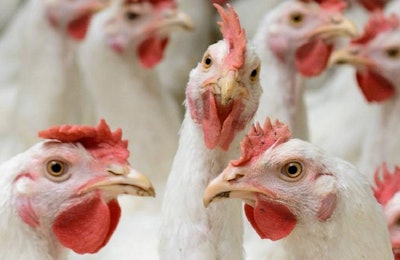
Animal health agencies in Russia and Egypt have reported new outbreaks of highly pathogenic avian influenza (HPAI) in poultry over the last week, and a low-pathogenic virus has been detected in a poultry flock in Libya.
There have also been 23 new confirmed human infections with avian influenza A(H7N9) virus in China over the last week.
New HPAI outbreaks reported in poultry in Egypt, Russia
Covering the period between the end of February and mid-April, there were six new outbreaks of HPAI in Egyptian poultry caused by the H5N8 virus, the national veterinary authority has reported to the World Organisation for Animal Health (OIE). Affecting one farm and five backyard flocks and covering six governates, a total of 1,344 birds were lost to the disease as a result of death or destruction.
Russia’s agriculture ministry has informed the OIE about two new HPAI outbreaks involving the H5N8 virus variant. Both were in the south-west of the country - in the Mari El Republic, where there was a previous recent outbreak, and for the first time in Samara oblast. A total of 100 poultry were involved in the two outbreaks.
Low-pathogenic virus detected in Libyan poultry
Under a United Nations’ Food and Agriculture (FAO) project, general surveillance of birds for avian flu has been carried out for some time. According to an OIE report, a low-pathogenic avian flu virus of the H7 has been detected in one sample from a small poultry farm in the Abuzian area in the Western Mountains earlier this month. Migratory birds were reported in the area about a month before the samples were taken, and this is thought to have been the infection source. The surviving 19 birds in the flock have been destroyed to prevent further spread of the virus.
Latest on HPAI in Germany, Italy
While the H5N8 HPAI virus has not caused disease outbreaks in German poultry flocks for some time, it has been detected in wild birds as recently as the second week of May in a bird of prey found dead in North Rhine Westphalia. Two other virus-positive cases reported to the OIE in the last week date back to December of 2016.
Following a total of 15 HPAI outbreaks in poultry in Italy, the last surveillance zone was closed in mid-May, according to the Italian health authority and research organization for animal health and food safety, IZSVe. In total, almost 340,000 birds died or were humanely destroyed as a result of H5N8 HPAI infections across five of the country’s northern regions. Eight of the outbreaks involved meat turkeys, two were in laying hens, four were in mixed backyard flocks, and one involved game birds.
Government steps in to control egg, poultry supplies in South Korea
South Korean poultry producers have been struggling to recover from a series of HPAI outbreaks starting in November last year, which decimated many flocks.
With domestic supplies insufficient to meet demand, prices for consumers have been rising, and the agriculture ministry announced last week that the government will release stock early in June to stabilize the markets, reports news agency, Yonhap.
The ministry is also exported to begin importing eggs in the coming weeks from Thailand, Denmark and the Netherlands.
Rumor monger fined in Taiwan
A man who spread false information about avian flu on the internet has been fined TWD50,000 (US$1,660), reports Focus Taiwan. The man was found guilty of breaking a law that prohibits the dissemination of rumors or false information about animal diseases or epidemics when he left a comment about a non-existent HPAI outbreak in ducks in Tainan on the city mayor’s Facebook page.
China reports new human infections
There have been 23 new laboratory-confirmed human infections with avian influenza A(H7N9) virus in China, according to the latest report from the National Health and Family Planning Commission of China (NHFPC) to the World Health Organization, bringing the total number of cases since 2013 to 1,486.
These cases were spread across 11 provinces - including seven deaths – and 19 of the patients are known to have had exposure to poultry.















